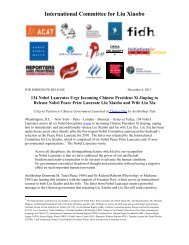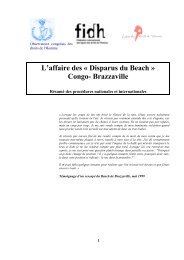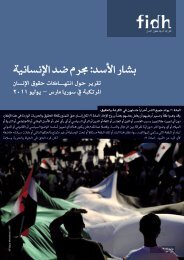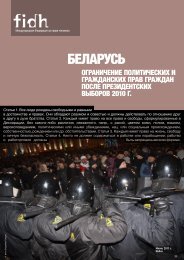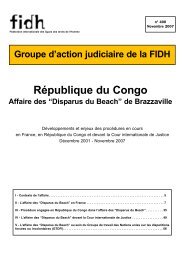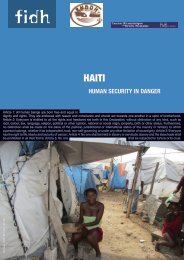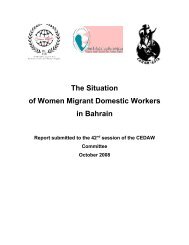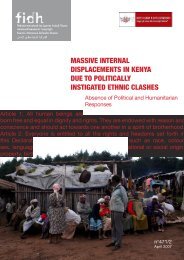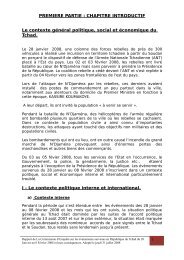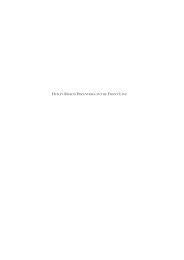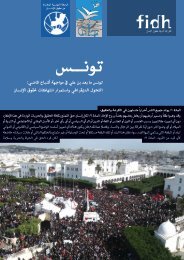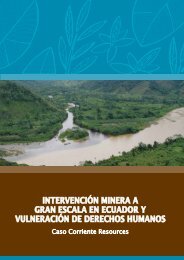III. A CONSTITUTION ATALL COSTOn June 27 the Interim government organised a referendum to approve the draft of a newConstitution for Kyrgyzstan, which officially consolidated the parliamentary Republic. Despitethe promises and the usual clichés, the new Constitution does not distribute poweron the basis of a true parliamentary system. It is in fact a hybrid system, both presidentialand parliamentary. Compared to the 2007 Constitution, the President’s authority is reduced,and that of the Jogorku Kenech (Parliament) is strengthened, but in reality this onlyrepresents a slight reorganisation of duties and no fundamental change. The new politicalélite was totally taken up by these constitutional matters and the organisation of the referendum,and therefore failed to be attentive to the social and political tensions developingin the country. The referendum was held anyway, despite the violent interethnic clashesthat broke out in the Osh region from June 10 to 14.III.1 The Constitution maintains a strong presidencyContrary to the Constitution of the Republic of Kyrgyzstan adopted by referendum in2007, the President is not defined as being the guardian of the Constitution nor as thehighest dignitary of the country (§1 and 2, Article 42 of the 2007 Constitution), although heis still the guardian of the unity of the people and of the authority of the State (§2, Article60 of the 2010 Constitution). He is elected for a single 6-year term, not for a five-year termrenewable once (Article 43, 2007 Constitution). Under the new Constitution the Presidentis elected by universal suffrage (§1, Article 61, 2010 Constitution). In the event of conflictwith Parliament, the Head of State can, among other things, invoke the similarity of theirlegitimacy thanks to the popular vote.The characteristic feature of a parliamentary republic is that the government is responsibleto parliament, whereas in a presidential republic, like the United States, the legislativebody cannot pass a vote of no confidence on the executive, and the Head of State cannotdissolve parliament. In the new Kyrgyz Constitution on the initiative of a third of thedeputies, a majority can pass a vote of no confidence (§3 and 5, Article 85 of the 2010Constitution). Such a vote does not, however, necessarily bring down the government.The President can “not agree” with the deputies' decision, and in that case the governmentremains in office as long as Parliament does not again pass a vote of no confidencewithin 3 months (§7, Article 85 of the 2010 Constitution). The first draft of the Constitutionstipulated that the President could dissolve Parliament if it twice passed a vote of no confidence,but the provision was finally dropped.In the new Constitution the President can dissolve Parliament. Under §1, Article 86 ofthe 2010 Constitution the Prime minister can, once a year, call for a vote of confidence.If Parliament does not pass such a vote, the President has the last word: he can eitherdismiss the government, or dissolve Parliament (§1, Article 86 of the 2010 Constitution).Parliament can also be threatened with dissolution if it rejects the programme of a newlyappointed government (§6, Article 84 of the 2010 Constitution).In addition to participating in the appointment and dismissal of the government, the Presidentdirectly appoints the Minister for Defence and the Director of the State NationalSecurity Service (GSNB) (§2, Article 64 of the 2010 Constitution). Contrary to the 2007Constitution, however, the President does not control directly the National Guard and theState Security. The President is the Commander-in-Chief of the Armies (§8, Article 64 ofthe 2010 Constitution). He proposes to Parliament candidates for the positions of GeneralProsecutor, President of the National Bank, a third of the Central Electoral Commission(§3-5, Article 64 of the 2010 Constitution) – and these are only some of the appointmentsfor which he proposes candidates. In the legislative process, he has a right of veto, whichcan only be overthrown by a two-thirds vote of the deputies (§2-3, Article 81 of the 2010Constitution). The President can even dissolve local Parliaments under certain conditions(§2, Article 64 of the 2010 Constitution). So the President is a long way from being a mere“principal notary public” as is claimed by those who assert that the new Constitution establishesa parliamentary form of government.III.2 No guarantee of independence for the judiciaryIn the chapter on the judiciary, three provisions are of particular note. The first, the mostcommented on, concerns the abolition of the Constitutional Court and the transfer ofits jurisdiction on matters of constitutionality to a specialised Constitutional Chamber ofthe Supreme Court. This is in fact a retroactive confirmation in the fundamental law of adecree issued by the Interim government, which, by a stroke of the pen, had not only dissolvedparliament, but also the Constitutional Court (not only in its concrete compositionbut as a body as such) 41 .It is true that the Constitutional judges had not been very impartial, neither towards AskarAkayev (whom they allowed to stand for a third time in 2000, considering that his first termbegan before the adoption of the 1993 Constitution and therefore did not count), nor towardsKurmanbek Bakiyev (by cancelling the amendments adopted by Parliament, therebyallowing the President to organise a referendum on the new Constitution in 2007 42 ).The Venice Commission deplored the recent decisions concerning constitutional controlin Kyrgyzstan, and called for them to be reconsidered, without success 43 .The Constitutional Court was perhaps not perfect, but not to the extent of justifying theadoption of a new provision of the fundamental law (§5, Article 97) that stipulates that, onthe basis of a proposal by the Judiciary Council presented to Parliament by the President,the deputies can, by a two-thirds majority, dismiss a judge of the Constitutional Chamber.Concerning the lower courts, the Constitution extends the trial period of recently appointedjudges to 5 years. It is only afterwards that they can be appointed for life (until retirement).Such a rule (which is of course accompanied by a number of other provisions) hasalready been used to set up a judicial system subservient to the political authority, forexample in Russia and Belarus. What is striking here is that it is be embodied in the Constitution.Developments in Kyrgyzstan being unpredictable, such a rule is likely to makethe judicial system less independent vis-à-vis the executive.By Decrees issued on July 28 and August 3, 2010, the President of Kyrgyzstan dismissed7 judges of the Supreme Court and 19 judges of local courts. Human rights defenders,who have denounced corruption among the judiciary, are nevertheless concerned at thesearbitrary measures, which are not based on reliable investigations.III.3 The referendum: its preparation and the voteOn May 19, 2010 the Interim government announced that a referendum would be held onJune 27, 2010. The referendum covered three points: the adoption of the draft of the newConstitution, the appointment of Roza Otunbaeva as President during the interim period(up until December 31, 2011, without the possibility of standing for the Presidency in 2012)41. Paragraph 10 of Article 1 of the law on the entry into force of the Constitution of the Republic of Kyrgyzstan, adopted by referendumon June 27, 2010, at the same time as the Constitution, specifies that the jurisdiction of the judges of the Constitutional Court ceaseswith the publication of Decree n°2 on the dissolution of the Constitutional Court issued on April 12, 2010 by the Interim government.The General Prosecutor’s office (whose building was destroyed by fire during the April events) occupies at present the ConstitutionalCourt building. In the main staircase a frame can still be seen with the mention “Judges of the Constitutional Court”, but the portraitsof the judges have disappeared.42. Ruling of the Constitutional Court of the Republic of Kyrgyzstan, September 14, 2007: (http://www.ks.kg/index.php?option=com_content&view=article&id=284%3Aresh14092007&catid=60%3Aresh2007&Itemid=66&lang=ru43. Conclusion on the draft Constitution of the Republic of Kyrgyzstan, drafted on May 21, 2010 and adopted on June 4, 2010.18 / KYRGYZSTAN <strong>FIDH</strong> – KYRGYZSTAN / 19
and the abolition of the Constitutional Court. The preparation of the referendum encounteredmany difficulties. The electoral lists, for instance, were only ready a week beforethe vote, which meant that they could be neither checked nor completed. The number ofrefugees and displaced persons in the south of the country was not given. 6 days beforethe vote, the exact number of polling stations had not been defined 44 . In this context, theInterim government had prepared no solution in the event of the Constitution not beingadopted, and behaved as if it was certain beforehand of the positive result 45 . In a perfectlyopportunistic manner, the Interim government lifted the state of emergency the day beforethe referendum 46 and restored it even before the votes were all counted, and maintainedit until August 9 in the south.Not many documents were distributed to explain the new Constitution. One of them was“Comments on the new draft Constitution” published by the associative movement: “MyConstitution is my talisman”. The movement was set up by social activists, close to theAta-Leken party led by Omurbek Tekebaev, who was at the time the Vice Prime minister ofthe Interim government. Despite the clearly partisan nature of the movement, which calledon the electorate to vote for the new Constitution, the European Union and the UnitedNations Development Programme (UNDP) financed its publications. The comments wereopenly propagandist, and instead of simply presenting the main features of the Constitution,it pressed people to vote in favour with slogans such as ‘The President is the Head ofState and the arbitrator’, ‘Parliament has a key role in the power system of the State’, ‘Thecourts: reform and cleaning up’, ‘Local assemblies: full powers to the soviets!’, ‘The implementationof the constitutional reform will prevent concentration of power, and its abuse’.In order to guarantee security on the day of the vote, the Bishkek GUVD undertook tosend four policemen (two officers and two subalterns) to each voting station (althoughthey were incapable of giving the number of polling stations planned in Bishkek 47 ) as wellas 6 or 7 members of the popular militia. In addition to the presence of the police, therewere to be representatives of the central administration of the ministry of Defence and theministry of the Interior, of the financial police, of the ministry of the Interior Academy andthe police college 48 . Although there were only four policemen in each polling station, noserious incident on voting day was reported.The manner in which voting took place gave rise to numerous contestations, even in Bishkek.The text of the Constitution was not available in the polling stations, and it was difficultfor the voters to have access to it. In the centre of Bishkek there was one single noticeboard with the text, and it had only been published in the Official Journal 49 . Voters weresupposed to be stamped with a transparent substance sensitive to ultra violet rays, eachvoter being checked to make sure no one would be able to vote several times. However,although the marks were stamped on, it was difficult to check them. The controllers werenot always able to see the mark. The Interim government issue a Decree authorising voters,all over the country, to vote away from their place of domicile, so that any citizen couldvote in any polling station. As it was difficult to check voters, it is possible that some votersmay have voted in several polling stations. Voting slips were issued on presentation of adocument certifying the identity of the person, but not necessarily his nationality (labourpermits, for instance). It is difficult to judge to what extent such possible offences mayhave influenced the result. The new Constitution was adopted with a ‘yes’ vote of 90.59%.The way the referendum was organised did not permit an impartial vote. The instabilitythat surrounded the poll was illustrated by the lifting of the state of emergency, dictated bycircumstance, although the clashes had barely subsided and violations continued in thesouth. In such an uncertain context, it is possible that the population may have chosen,whatever the cost, a stable institutional solution.44. Interview of Dinara Oshurakhunova, 21.06.2010.45. Interview of Tattu Mambetalieva, 21.06.2010, and of Dinara Oshurakhunova, 21.06.2010.46. The provisions relating to the organisation of a referendum were altered, just in case: whereas it was not permitted to organise areferendum in an emergency situation, a new rule was adopted saying that a referendum would be considered to be valid even in anemergency situation if more than half the population lived in regions under the “normal regime”. (Decree n° 72, June 16, 2010). http://www.shailoo.gov.kg/dekrety-vremennogo-pravitelstva/o-vnesenii-izmeneniya-v-dekret-vremennogo-pravitelstva-kyrgyzskoj-respublikiot-21-aprelya-2010-goda-20o-vnesenii-izmeneniya-v-dekret-vremennogo-pravitelstva-kyrgyzskoj-respubliki-ot-21-aprelya-2010/).47. 220 polling stations were organised in Bishkek.48. Interview of Zaurbek Rysaliev, 24.06.2010.49. The members of the mission tried to obtain a printed copy of the Constitution from newsagents in Bishkek, but were unsuccessful.One newspaper vendor advised them to approach the person responsible for the management of their place of residence, who shouldbe able to give them a copy.20 / KYRGYZSTAN <strong>FIDH</strong> – KYRGYZSTAN / 21




